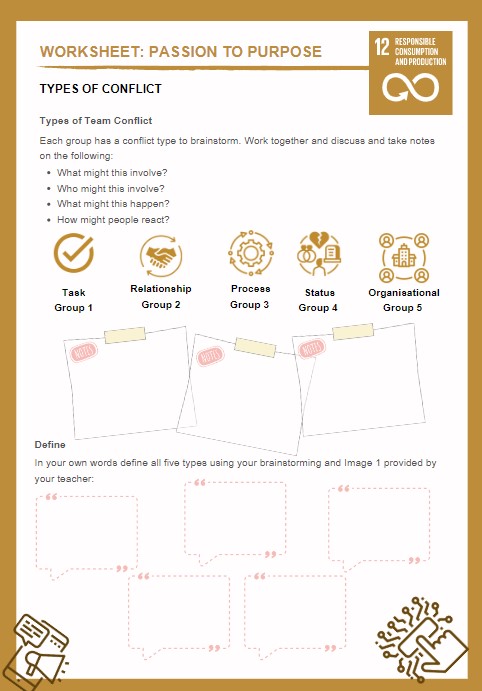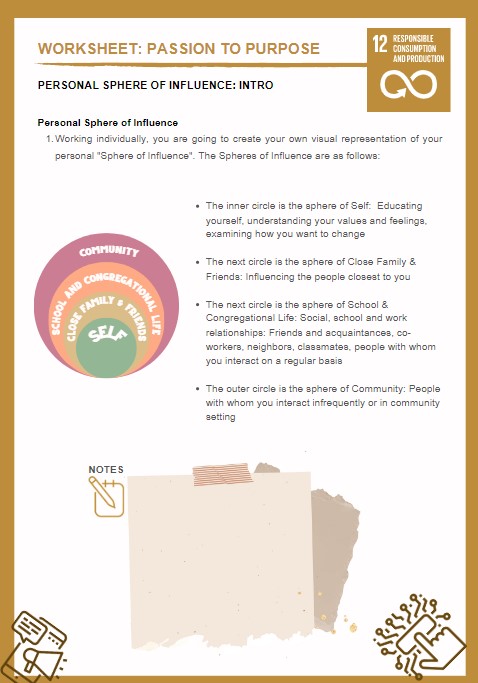From Passion to Purpose; how passion and social emotional learning sparks future-ready learners
- Admin
- May 20, 2023
- 5 min read
Updated: Jun 7, 2023
Social-emotional learning (SEL) enables participants to develop the skills to manage their emotions, achieve individual and group goals, build positive relationships and make informed decisions. As a broad overview, it covers the following key themes:
Self-awareness
Self-management
Social awareness
Relationships
Decision making
Our mental health has never been more important, coming out of the COVID-19 pandemic and with the knowledge that SEL impacts not only learning, but long-term life outcomes, it is critical that this methodology is embedded within all aspects of learning and resource development.
Having an interest, or a passion, gives you a reason to keep learning about something. It is the spark that inspires and drives individuals towards a goal, no matter the degree of difficulty or chance of success. By integrating personal passion into the educational experiences, learners are able to develop core skills and competencies needed for participating in the future world they will graduate into, while being intrinsically motivated to learn.
Passion to Purpose
We work with external experts to embed skills and competencies that are often overlooked within national curricula. This year we collaborated with Bianca Peel, an SEL specialist, to upgrade our Problem to Pitch module as Passion to Purpose makes it more relevant for the needs and demands of the 21st Century and the VUCA (Volatile, Uncertain, Complex and Ambiguous) world.
Passion to Purpose is a generic project management module that can be adapted to any topic. It introduces students to the concept and process of Circular Design Thinking; the cognitive, strategic and practical processes for creative problem solving and embedded with social and emotional learning skills development necessary to improve pupils' decision-making skills, interaction with others and their self-management of emotions as well as self and social awareness. Through the lesson plans and activities, learners are supported to practise problem solving and critical thinking skills as individuals and part of a group, be introduced to project management tools and begin to develop core skills of social and emotional learning. The lessons are aligned to circular, design thinking and by embedding SEL concepts, a foundation for interconnectedness and environment can start to be developed.
Our external expert for the development of this module was Bianca Peel, who has over 20 years experience in teaching and learning and now focuses her resource development and delivery on holistic-led, empathic and empowering approaches. We interviewed Bianca about her work, and why SEL is so important for learners as part of our upcoming series introducing the experts we work with.
Who is Bianca Peel Consultancy & Education?

Bianca Peel Consultancy & Education (BPCE) is a values-led consultancy on coaching and mentoring in the implementation of impactful holistic, creative learning and development solutions aligned to the UN Sustainability Goals.
What is your mission statement?
In a rapidly changing world, understanding and innovation both in personal and professional contexts are needed to thrive. Our mission is to embed empathy and creativity and align with the UN Sustainability Goals, in all learning and empower all to thrive.
What do you offer? What is your skill set and training?
With over 20 years in the education sector, I am qualified in Language and Education, English Education, Outdoor education, Early Childhood Care and Education, Montessori pedagogy, Holistic Integrated Creative Arts Therapy. Through expertise in areas such as project-based learning, arts integration, and social-emotional learning, I work closely with clients to design customised learning programs that meet their specific needs and goals. By emphasising creative and holistic learning approaches, I am helping organisations to develop well-rounded individuals with the skills they need to succeed both personally and professionally.
To support organisations to create learning environments that foster creativity, critical thinking, and a love of learning, BPCE offers;
consulting, training, coaching and mentoring services
resource design and development services
Tell us about your work with Code Division and the Women Returners Programme
In 2022, I was honoured with co-designing and leading on the facilitation of multiple Women Returners programmes including one Ukrainian Digital Empowerment programme with Code Division, a social enterprise fighting to reduce inequalities in tech industries. These programmes supported and empowered women of all ages returning to the workforce through a holistic, creative and trauma-informed approach to learning in two distinct capacities;
utilise the most up-to-date business tools and technologies to help them learn data cleaning, transformation, visualisation, storytelling and how to use statistics to interpret data.
develop their power skills (soft skills) in communication, critical thinking, collaboration and creativity which improved
a) academic success by promoting positive mental health through reducing symptoms of anxiety, depression, and stress, and improving coping skills
b) positive relationships: individuals build positive relationships by being taught how to communicate effectively, show empathy, and build trust.
c) responsible decision-making: individuals make responsible decisions from being taught how to consider the consequences of their actions, solve problems, and manage conflicts.
Why is SEL important?
Social and emotional learning (SEL) is important because it helps individuals develop essential life skills that enable them to manage their emotions, build positive relationships, and make responsible decisions. These skills are critical for success in all aspects of life, including academic and career success, positive relationships, and overall well-being. Here are some reasons why social and emotional learning is important:
Academic success: Research shows that social and emotional learning can improve academic performance by improving student behaviour, attitudes toward school, and the quality of relationships with teachers and peers.
Improved mental health: SEL can promote positive mental health by reducing symptoms of anxiety, depression, and stress, and improving coping skills.
Positive relationships: SEL can help individuals build positive relationships by teaching them how to communicate effectively, show empathy, and build trust.
Responsible decision-making: SEL can help individuals make responsible decisions by teaching them how to consider the consequences of their actions, solve problems, and manage conflicts.
Overall, social and emotional learning is essential for personal and academic success, as well as for building a better society.
Bianca's contribution to MCSS programmes ensures that SEL is incorporated into our TY programmes to strengthen and support our pedagogical core.
The Future is Now.
It is time to prepare today's students for today’s world.
Please get in contact at hello@futurefocus21c.com if you are interested in using our resources with your learners.
Muinín Catalyst Sustainable STEAM uses a transdisciplinary, STEAM-based pedagogical approach. Returning to SDG 4, Target 4.7, one of the core missions of the Muinín Catalyst Sustainable STEAM programme is to ensure an arts / design and culture-led approach to learning that is transdisciplinary and transformative. Learning that supports the development of informed citizens, that are systemic, critical and creative thinkers who can apply their knowledge in agile ways that are sensitive, generative and appropriately responsive to context, in relevant and meaningful ways.
This is done through placed-based learning, which enables individuals to experience learning in local, real-life scenarios. Place-based approaches to learning grounded in local communities and contexts are relevant, engaging and inquiry-based. Students gain confidence and competence in affecting change, learning to manage risk, and develop creative, real-world solutions that are eco-socially just and restorative.













Comments